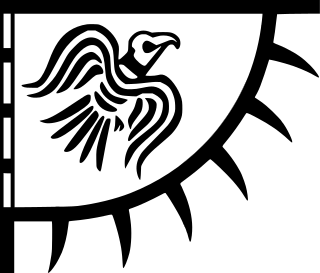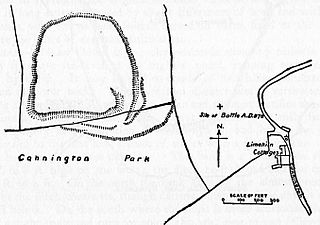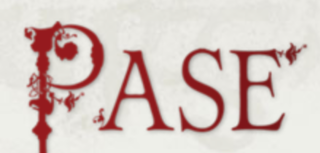
Alfred the Great was King of the West Saxons from 871 to 886, and King of the Anglo-Saxons from 886 until his death in 899. He was the youngest son of King Æthelwulf and his first wife Osburh, who both died when Alfred was young. Three of Alfred's brothers, Æthelbald, Æthelberht and Æthelred, reigned in turn before him. Under Alfred's rule, considerable administrative and military reforms were introduced, prompting lasting change in England.

The Kingdom of Wessex was an Anglo-Saxon kingdom in the south of Great Britain, from 519 until England was unified by Æthelstan in 927.

The Anglo-Saxons were a cultural group that inhabited England in the Early Middle Ages. They traced their origins to settlers who came to Britain from mainland Europe in the 5th century. However, the ethnogenesis of the Anglo-Saxons happened within Britain, and the identity was not merely imported. Anglo-Saxon identity arose from interaction between incoming groups from several Germanic tribes, both amongst themselves, and with indigenous Britons. Many of the natives, over time, adopted Anglo-Saxon culture and language and were assimilated. The Anglo-Saxons established the concept, and the Kingdom, of England, and though the modern English language owes somewhat less than 26% of its words to their language, this includes the vast majority of words used in everyday speech.

Æthelflæd, Lady of the Mercians ruled Mercia in the English Midlands from 911 until her death. She was the eldest daughter of Alfred the Great, king of the Anglo-Saxon kingdom of Wessex, and his wife Ealhswith.

Æthelstan or Athelstan was King of the Anglo-Saxons from 924 to 927 and King of the English from 927 to his death in 939. He was the son of King Edward the Elder and his first wife, Ecgwynn.Modern historians regard him as the first King of England and one of the "greatest Anglo-Saxon kings". He never married and had no children; he was succeeded by his half-brother, Edmund I.

The Danelaw was the part of England in which the laws of the Danes held sway and dominated those of the Anglo-Saxons. The Danelaw contrasts with the West Saxon law and the Mercian law. The term is first recorded in the early 11th century as Dena lage. The areas that constituted the Danelaw lie in northern and eastern England, long occupied by Danes and other Norsemen.
Guthrum was King of East Anglia in the late 9th century. Originally a native of Denmark, he was one of the leaders of the "Great Summer Army" that arrived in Reading during April 871 to join forces with the Great Heathen Army, whose intentions were to conquer the kingdoms of Anglo-Saxon England. The combined armies were successful in conquering the kingdoms of East Anglia, Mercia, and Northumbria, and overran Alfred the Great's Wessex, but were ultimately defeated by Alfred at the Battle of Edington in 878. The Danes retreated to their stronghold, where Alfred laid siege and eventually Guthrum surrendered.

At the Battle of Edington, an army of the kingdom of Wessex under Alfred the Great defeated the Great Heathen Army led by the Dane Guthrum on a date between 6 and 12 May 878, resulting in the Treaty of Wedmore later the same year. Primary sources locate the battle at "Eðandun". Until a scholarly consensus linked the battle site with the present-day village of Edington in Wiltshire, it was known as the Battle of Ethandun. This name continues to be used.
Ceolwulf II was the last king of independent Mercia. He succeeded Burgred of Mercia who was deposed by the Vikings in 874. His reign is generally dated 874 to 879 based on a Mercian regnal list which gives him a reign of five years. However, D. P. Kirby argues that he probably reigned into the early 880s. By 883, he was replaced by Æthelred, Lord of the Mercians, who became ruler of Mercia with the support of Alfred the Great, king of Wessex.

The Battle of Cynwit was a battle between West Saxons and Vikings in 878 at a fort which Asser calls Cynwit. The location of the battle is not known for sure but probably was at Countisbury Hill, near Countisbury, Devon.

Anglo-Saxon England or Early Medieval England, existing from the 5th to the 11th centuries from the end of Roman Britain until the Norman conquest in 1066, consisted of various Anglo-Saxon kingdoms until 927, when it was united as the Kingdom of England by King Æthelstan. It became part of the short-lived North Sea Empire of Cnut the Great, a personal union between England, Denmark and Norway in the 11th century.

The Great Heathen Army, also known as the Viking Great Army, was a coalition of Scandinavian warriors who invaded England in AD 865. Since the late 8th century, the Vikings had been engaging in raids on centres of wealth, such as monasteries. The Great Heathen Army was much larger and aimed to conquer and occupy the four kingdoms of East Anglia, Northumbria, Mercia and Wessex.

The Prosopography of Anglo-Saxon England (PASE) is a database and associated website that aims to construct a prosopography of individuals within Anglo-Saxon England The PASE online database presents details of the lives of every recorded individual who lived in, or was closely connected with, Anglo-Saxon England from 597 to 1087, with specific citations to each primary source describing each factoid.

Bagsecg, also known as Bacgsecg, was a viking and a leader of the Great Army, which invaded England. According to the Anglo-Saxon Chronicle, Bagsecg and Healfdene were joint commanders of the Great Army that invaded the Kingdom of Wessex during the northern winter of 870/71.

Edward the Elder was King of the Anglo-Saxons from 899 until his death in 924. He was the elder son of Alfred the Great and his wife Ealhswith. When Edward succeeded to the throne, he had to defeat a challenge from his cousin Æthelwold, who had a strong claim to the throne as the son of Alfred's elder brother and predecessor, Æthelred I.
Dame Janet Laughland Nelson, also known as Jinty Nelson, is a British historian. She is Emerita Professor of Medieval History at King's College London.
Barbara Yorke FRHistS FSA is a historian of Anglo-Saxon England, specialising in many subtopics, including 19th-century Anglo-Saxonism. She is currently emeritus professor of early Medieval history at the University of Winchester, and is a fellow of the Royal Historical Society. She is an honorary professor of the Institute of Archaeology at University College London.

The Heptarchy were the seven petty kingdoms of Anglo-Saxon England that flourished from the Anglo-Saxon settlement of Britain in the 5th century until they were consolidated in the 8th century into the four kingdoms of Mercia, Northumbria, Wessex and East Anglia.
The Battle of Buttington was fought in 893 between a Viking army and an alliance of Anglo-Saxons and Welsh.

Alfred the Great was an Anglo-Saxon king of Wessex, an Anglo-Saxon kingdom that existed from 519 to 927 south of the river Thames in England. In the late 9th century, the Vikings had overrun most of the Anglo-Saxon kingdoms that constituted England at the time. Alfred's reign has become regarded as pivotal in the eventual unification of England, after he famously defended Wessex and southern England against the Viking invasions, winning a decisive victory at the Battle of Edington in 878.















